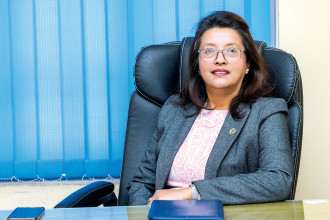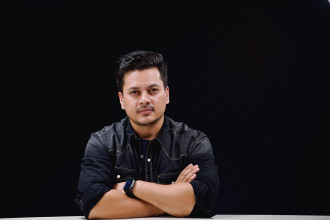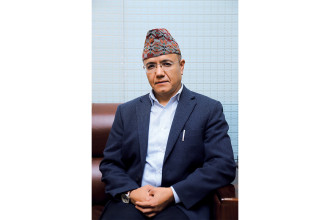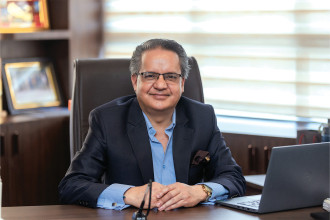-(1)-1752214965.jpg)
Dr Reeta Gurung
CEO, Tilganga Eye Hospital & Tilganaga Institute of Opthalmology
Dr Reeta Gurung is the Chief Executive Officer of Tilganga Eye Hospital and is Nepal’s leading cornea specialist granting the gift of sight to countless patients. She serves on the board of Nick Simons Institute and BP Eye Foundation. Dr Gurung is also a master trainer at the Cure Blindness Project where she teaches doctors and operates on patients in need worldwide.
Dr Gurung obtained an MSc in Ophthalmology from Bristol University, UK in 1990. She has completed the Tropical Ophthalmology course from the Institute of Ophthalmology, Moorfields Eye Hospital, UK and the Clinical Refraction and Lasik courses from the University of Wales, UK. In 2001, she was awarded a fellowship in Cornea and External Eye Diseases from the Eye Hospital Rotterdam, Holland and an MSc in Community Ophthalmology from London School of Hygiene and Tropical Medicine, UK in 2006.
Committed to providing rural eye care in Nepal since 1993, Dr Gurung served as Deputy Medical Director at the Tilganga Institute of Ophthalmology till 2014 overseeing the establishment of Nepal’s first Eye Bank. As CEO, her dedication and hard work have shaped Tilganga’s success in quality of care and impact in Nepal serving upwards of 4.8 million patients.
Dr Gurung is the recipient of 2025 WOW Women Achievers Award in Leadership. In this edition of Business 360, Dr Gurung answers our questions on her experience of leading Nepal’s premier destination for treating ailments of the eye.
What are the responsibilities of the CEO of Tilganga Eye Hospital?
I am responsible for financially sustaining this hospital. There are many who work here that I am accountable to. At the same time, if someone walks through Tilganga’s doors and says they have no money, it is still my responsibility to treat them. To balance the two, I talk to benefactors. Our donors pay for that patient at the door. Tilganga, that needs to consistently pay salaries and bills, will be fine because the procedure performed within our walls was paid for. Likewise, the patient will be fine because they do not have to go back to a life without seeing just because they didn’t have money. It is my responsibility to find that money and solidify our financial position. If doctors keep doing free surgeries, Tilganga may not stand as a hospital next year. So far, I have been successful in finding that money. As the CEO of Tilganga and a doctor to patients, I find ways to reduce the cost of surgery and increase the profit of the hospital.
Do you believe leadership is inborn or acquired?
There are people with in-born traits, who through just a few feats can find themselves in a leadership role. I would not count myself as one of those people. Over the course of my career, I have made my way by learning and I am still pursuing knowledge. It might be easier for those who are born with that ‘leadership’ trait, but that is not me, I believe effort yields results, and consistent effort leads to good results. I work for a tangible purpose. To achieve that purpose, I give 100% and I do that with passion. That is how I make my way to leadership positions.
What do the people being led expect from their leader?
When you are in the position to make a lot of decisions, you have to be very clear on what your goal is so that you can talk to your people clearly. In my case, if I fumble and appear unsure about the direction in which I am taking this hospital then what I say to the people here is not going to be very clear – they will not trust me. If I can get that feeling, they can too. I recommend people in leadership roles write down the path detailing where they, as an organisation, need to be; a timeline that needs to be clear to the people following them. But at the same time, the person in-charge of driving the organisation towards the goal needs to be open to changes and deviations in the path. That does not mean succumb to every whim, but do be open to suggestions. Leaders are not perfect, but they can be real and authentic, only then do the people follow.
-(1)-1752214965.jpg)
What key considerations should a leader consider when delegating decision-making to a colleague?
My power to make decisions, if I give to my colleague, comes with a share of the accountability; the delegate is now responsible for delivering results to me. I can give them the time they need to think things through, trust their judgement, and guide them. As an experienced practitioner of ophthalmology, I have already been in different scenarios that inform my decisions. If my colleague chooses to forgo my advice in favour of their own, I look forward to the results that they will report to me. Because in that scenario, either my information was up to date or it was not, one or the other has to be true. There are logistics behind every decision, logistics that cause a ripple effect affecting other aspects of operation. Striking the balance is not easy but that is what a leader must do. Though it is not always a thankful task, to be delegated responsibility is a good thing. The tales we tell are the results of our deeds.
Is leading a classroom different than leading a hospital?
I would not be an educator if I were not working at this hospital. What I practice at the hospital as a doctor and CEO are what I teach because they are intertwined. No, I do not feel very different. Standing in front of hundreds of students and giving didactic lectures, I am aware I am speaking to people who know their fundamentals. I am adding to the things they already know. However, just saying, “I’ll teach you” isn’t enough when the trainee does not try. We get different types of students; students from Mongolia or North Korea who do not speak English, and that is a challenge. I have taught them too because they passionately wanted to learn.
Without theoretical knowledge there is no operating on someone’s eye. I have to be strong to tell students of their limitations, to make them comply with instructions because when operating on a patient together, my responsibility is to teach but at the same time we have to make the patient see. I am there to minimise the chances of running into complications by teaching students to perform the procedure step by step.
How do leaders win over new hires?
I respect the notice period the doctor gave to their previous organisation. That usually means we are hiring a person with principles. There are a limited number of ophthalmologists in Nepal and most of them are trained at Tilganga. Following their written exams, viva and induction with human resources, I encourage our colleagues to welcome the new doctor. I give them responsibilities beyond their patient duties because I want to induce in them the desire to reach for opportunities that working at Tilganga brings like attending international conferences, access to training and fellowships and developing a sub-specialty. Money is secondary, human resources are the most important resource. Doctors bring patients to this hospital and this hospital derives the most benefit from fostering the potential of the doctors that work here.
When should a leader pass on the baton?
At Tilganga hospital, the transition period from one leader to the next should be long. I am not possessive of this position and I will be around to share what I know to my successor. They will have their own order of operations, at the same time the hospital will continue to function. Because this is the place I put my heart, soul and body, I cannot abruptly leave the hospital one day and not look back. The person who takes over my position can sail through with my guidance. Time changes, need changes, mentality changes; medicine is a dynamic thing and we should not be scared of changes.
How do you prepare for the unforeseen?
I cannot accept when donors tell me to deplete Tilganga’s accounts first and only then will they replenish them with their support. The amount required to keep our operations functional for the next three months are always on reserve. Whether there be a natural disaster, a public health emergency, or an outbreak, the core team at Tilganga must be retained for when everything blows over and we are up and running again. Money is dear to everyone but if I am able to give our donors a transparent account of how their funds are being used, then I do not foresee the lack of money as being the thing that will not let us work.
A message to new doctors…
Fulfil your needs and your family’s needs. You could not have been where you are now without the support from your family. Show your compassion for patients, and dedication to your purpose. If you are lucky to get opportunities to serve beyond your purpose, take them.
Yes, there are doctors who look for opportunities abroad, not because they do not get paid well but they are frustrated with governance and the system. Kids who study to become doctors are academically gifted and it is not easy to complete medical school, you are one of them and you have ideas for how it should work. Doctors, stay with your family, it is fun in the long run.
In Nepal you can be a big fish in a small pond and there are many possibilities in store for you. If you look to me, you can see I am doing pretty okay and I did not go out of the country.






